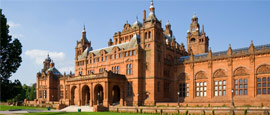Glasgow History
From declining industrial juggernaut to thriving cultural mecca, Glasgow is a city revitalised.
Glasgow's earliest inhabitants were Stone Age fisherman, and the Romans established a trading post at Cathures, the site of the existing city, around AD80.
In the sixth century a missionary nicknamed St Mungo actually founded the city, building a church on the site of the present-day cathedral.
By the 12th century, Glasgow had been granted city status. In 1451, Glasgow University was founded, and by the start of the 16th century, Glasgow had become an important religious and academic hub, where trades and crafts flourished.
In the 1770s, bigger ships could navigate further up the river, laying the foundations for 19th-century industry and shipbuilding.
The abundance of coal led to the growth of cotton factories and textile mills. Glasgow became one of the world's richest cities, reaching its zenith in industrial production around 1900.
The effects of the two world wars led to huge shipbuilding contracts for Glasgow, but the intensive Luftwaffe bombing of Clydeside during WWII devastated homes.
The post-war period saw increased global competition and despite the fact ships, including Cunard's QE2, and trains were still being constructed in Glasgow, the city started to suffer.
By the 1960s, the riverside wharves had fallen into dereliction. This, coupled with ill-conceived rebuilding efforts, had a profound impact.
By the 1970s and early 1980s, Glasgow's heavy industries had dwindled, and there was mass unemployment and urban decay.
The city's council set about rejuvenating Glasgow. In 1983, the Burrell Collection opened. Five years later, the city held the popular Garden Festival, and in 1990, Glasgow was designated European City of Culture.
The riverbank has been transformed into an entertainment and housing district, service industries have grown, and Glasgow's cultural scene is second-to-none.
In 2014, Glasgow hosted a hugely successful Commonwealth Games.
Did you know?
• Glasgow was once known as the 'second city in the British Empire'.
• The first international football game was played here in 1872. The result? Scotland 0-0 England.
• Glasgow bestowed the Freedom of the City on Nelson Mandela in 1981, nine years before his release.
Do you have any Feedback about this page?
© 2026 Columbus Travel Media Ltd. All rights reserved. No part of this site may be reproduced without our written permission, click here for information on Columbus Content Solutions.




 You know where
You know where